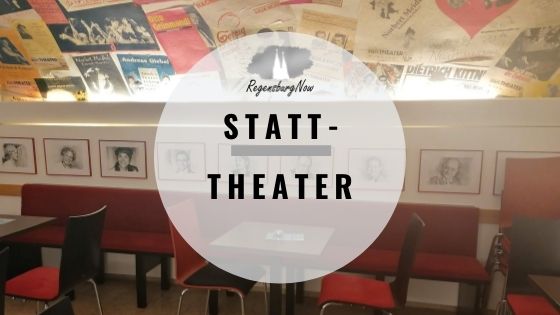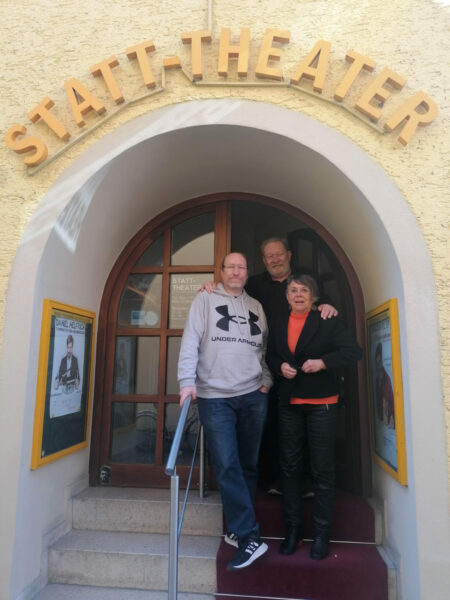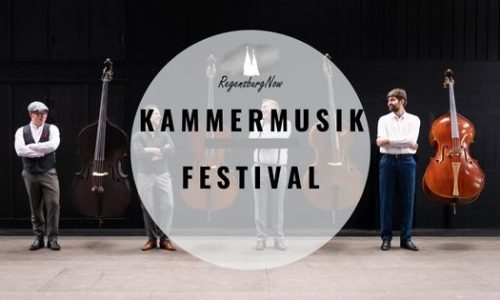
Statt-Theater
THE STATT THEATER IN REGENSBURG.
Regensburg not only has a municipal theater with five sections, but a whole theater landscape. We would like to introduce you to the various theaters this year. Let’s start with Regensburg’s Statt-Theater and a guest article by Ursula Gaisa (immerschick.de): The Statt-Theater cabaret theater in Winklergasse is a legendary venue in the heart of Regensburg. For almost 40 years, you can experience cabaret and cabaret at its best here. After two years of pandemic, the small basement theater is now reopening to the public. Time for a chat with the owners Inge Faes and Peter and Matthias Nikisch.
// How it all began //
It was 1980 when the brother of Peter Nikisch’s brother-in-law started performing cabaret with a motley crew of schoolchildren, students and trainees – in the rear building in Rote-Hahnen-Gasse. At the time, Peter Nikisch was a househusband after studying sociology, but was already writing for magazines such as “Titanic”. If cabaret, then real cabaret, he thought, and began to write his first texts for Michael and his comrades-in-arms. However, this “original troupe” didn’t feel like rehearsing, only Michael remained, and new people joined them, such as Wolfgang Maier, who was also part of the first in-house ensemble of the Statt-Theater in 1984. A pianist was needed. “Just for fun” – as they called themselves back then – were completed by a lady called Madelaine. The venue was the cellar under the Knossos-Palast in Keplerstraße. Conny Rother replaced Madeleine, which was the first real ensemble. An acquaintance of Michael’s then suggested the name change to Statt-Theater. For two years, they played under the Knossospalast until the landlord realized that the audience didn’t really go out to eat with him. After eight to ten performances, this connection also dissolved. People had to finish their training or studies. The pianist Eberhard Geyer, whom Nikisch still knew from school, ran into him one day and wanted to join in. “Then we were still missing a lady.” Eberhard thought of Inge Faes, whom he knew from the Theater Compagnie, or the Open Theatre at the university: “She can already sing.” The first Statt-Theater ensemble was complete. They started touring. “Sometimes in the Schwedenkugel back then, sometimes in the Hinterhaus, in the Scala cinema… In the Leerer Beutel…”
// The Winklergasse as a venue //
They began to look for suitable permanent venues and came across the current premises of the former Klein bakery. “We got the key from the estate agent and inspected the cellar with a “Pulmoll candle”, says Inge Faes. There was no light, but there was a hatch that could be used as an emergency exit. The sticking point was the money. How were they supposed to pay the deposit, no bank would lend. Inge Faes lived with Hanne Asch in an apartment in Weißgerbergraben at the time. Hanne, the future co-partner and accountant, all-round worker until her death nine years ago, was staining an old birdcage that she wanted to turn into a lamp. “I’ve got a savings book!” she interjected. And so, on December 14, 1984, the very first performance could take place in the cellar in Winklergasse.

// Good years //
With a few exceptions, Peter Nikisch has written a new cabaret program every year since then. Always political, always topical and pointed. Until the fall of communism in 1990, the financial situation remained tense. In the beginning, they performed on Tuesdays and Fridays and invited guests, but it never occurred to them that the whole thing would last more than a few years. Then the good years began: sold-out performances for weeks and months on end – both by the house ensemble and by illustrious guests from all over Germany. “Apart from the Unitheater, Bauerntheater and Städtische Bühnen, there was nothing here.” In the big cities, the first cabarets were already closing again, but things were booming in Regensburg. Nikisch was quick to track down talents who later became stars and then remained loyal to the theater. Even if they could otherwise have performed in much larger venues with much higher fees. Luise Kinseher, Michael Altinger, Christian Springer, Maria Peschek, Peter Vollmer, Dietrich Piano Paul, Holger Paetz, Severin Groebner and Frank Lüdecke always enjoy performing in this 70-seat living room with its special charm.
In the house ensemble, it was mainly the pianists who changed. Wolfgang Maier was replaced by Wolfgang Köppl, who suffered a serious heart attack in 2000 and has been severely disabled ever since.

// Artists’ Worlds //
The anecdotes that have accumulated over the years are wonderful. Helen Vita came with her dog Püppi, who sat in the tiny dressing room during the performance and started barking after the second encore. Evelyn Künnecke came, “because if Helen does it, I’ll do it too.” “They were two wonderful ladies,” remembers Nikisch. And that Künnecke, already somewhat older in her comeback and with poor eyesight, literally “exploded” on stage. Her hotel room had to be changed because there was a step. “One was too cold, the other too dark. It had to have a bathtub and a board in the bed. The so-called Evelyn Künnecke staircase was built for the stage in the basement, a construction with a built-in femoral neck fracture. But everything went well,” recalls Inge Faes: “We used to have dinner with every artist in the evening. Unimaginable today.” The multi-day engagements were also good for the artists from abroad. “And that we’ve always known both sides,” says Faes.
Jörg Hube and his Herzkasperl program barely got his coffin into the cellar. Georg Kreisler was hosted in the Kolping Hall and the Neuhaussaal. “He was nervous or a bit brittle before the performance.” He needed a chaser to the piano as he had very poor eyesight. Peter set everything up and went to the bathroom. “Mr. Nikisch!” he called out. “If the light doesn’t come on immediately, I’ll stop the performance…” 400 people in the audience. In the interval, he was all cheerful again. Urban Priol, Georg Schramm, Dieter Nuhr, Erwin Grosche, Andreas Giebel, Matthias Deutschmann, Volker Pispers, Hannes Ringlstetter, Andreas Rebers, many of them still like to come back today.

And today?
Tobias Ostermeier and pianist Matthias Leitner have been part of the ensemble for 17 years now. In 2016, after receiving the Culture Prize of the City of Regensburg, Peter Nikisch left the ensemble; Leitner, Faes and Ostermeier write the texts for the newer programs, using some of Nikisch’s gems. In 2007, his son, Matthias Nikisch, completed his training as an event manager at the Statt-Theater and runs the theater together with his father and Inge Faes. Incidentally, “Im Abgang blumig” is to be the last program with Faes’ involvement. The support association has been very important from the very beginning: “Without it, we would have gone under,” says Faes. It consists mainly of private individuals who still support the team today. During the sold-out times, there were plans to expand, but today they are glad they didn’t take this step. “Today, every small town has a cultural association, the stars from television fill huge halls,” says Inge Faes, explaining the decline in audience numbers. The fact that cabaret can be seen on Bayerischer Rundfunk from Thursday to Saturday is not good either. The ageing audience prefers to stay at home. “Maybe we should have switched to stand-up comedy or poetry slam, but that’s not our thing,” says Nikisch. “And then the various slumps that simply happened due to illness, and now of course with this pandemic. And then things get back to some extent, then comes the war and inflation. So it’s a catastrophe,” continues Inge Faes.

In the past two years, exactly eight events have been held in the house. The ensemble made do with open-air performances at the Thon-Dittmer-Palais, in Traidendorf or at Café Pernsteiner. The DEZ stage was founded by Undine Schneider, another opportunity for cabaret performances. But now it should and will start again – despite everything. On Friday, March 18 and Saturday, March 19 at 7.30 pm, music cabaret artist Daniel Helfrich from Weinheim will be celebrating his Statt-Theater premiere! You can order tickets for his current program “Trennkost ist kein Abschiedsessen” by email to info@statt-theater.de, by phone on 0941/53302 or directly at okticket.de.
Many thanks to our guest author Ursula Gaisa for the lovely article! Click here to go to Ursula’s blog: immerschick.de

(unpaid advertising due to naming and shaming)


(unpaid advertising due to naming and shaming)
Our excursion tips on Facebook:
Do you already know our Facebook group “Excursion tips in and around Regensburg plus Upper Palatinate” with more than 22,000 members? Click here for the group.
RegensburgNow.de has over 40,000 readers per month and is a site of the RegensburgNow agency
If you are interested in advertising on RegensburgNow, please write to us at mail@regensburgnow.de

Don’t miss a thing! Subscribe to our newsletter:
Want more tips? Then please click here:















